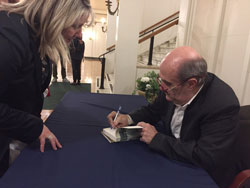The Visiting Writer Series hosted acclaimed fiction writer, Colm Tóibín, on Tuesday, April 4, in Wilson Auditorium. This is the last installment of the spring 2017 season, and marks the end of the 12th season of the Visiting Writer Series.
The event opened with two introductions: Michael Thomas, Associate Dean of the School of Humanities and Social Sciences and Director of the Visiting Writers Series and Dr. Elizabeth Gilmartin, lecturer of English, who teaches Colm Tóibín’s Brooklyn in her Irish Literature class.
Gilmartin mentioned in her introduction of Tóibín that he had previously visited the University seven years prior to this most re-cent visit, which was just after one of his most popular works, Brooklyn, was published.
One thing that Gilmartin claims that Tóibín is especially good at is his character development, especially of mother characters, and the conveyance of themes of “identity creation, grief, loss, and the family complex.”
According to Gilmartin, this character and theme development can be seen in Tóibín’s work The Testament of Mary. In this work, Tóibín humanizes the Virgin Mother, Mary, to where the reader can actually relate to such a historic and influential fig-ure.
Gilmartin herself has a connection to the book Brooklyn. She shared, “My own grandmother came over from Ireland as a 16 year old by herself; it was a very similar story, but she ended up working in a diner [not a garment store like Eilis in the novel] in Brooklyn. The basic story has that connection.”
After Gilmartin’s introduction, Tóibín took the podium and read from two of his works: Nora Webster and Brooklyn. Nora Webster is a novel influenced by Tóibín’s own life. In this novel, Tóibín conveys the story of a wid-owed mother who has to rebuild her life after the death of her husband.
Gilmartin commented, “I knew it (Nora Webster) had some autobiographical elements to it, but I didn’t realize the extent until he started talking. He was quite open about it being autobiographical. Any time you see an author talking about their writing, you really get a better sense of where they are coming from.”
Tóibín explained that the novel was based in 1967 Southeast Ireland. At this time, the death of a family member was mourned differently than people in America. In Ireland, when someone passes away, people—family, friends, and acquaintances—gather in the home of the deceased and as the months progress, the people slowly stop coming every day. The purpose of this is to keep the family of the deceased’s minds off of the passing of a loved one.
Tóibín read from the opening from Nora Webster, which was about this Irish tradition, and one phrase that was repeated more than once was “people mean well.” This emphasized the exhaustion that the waves of people visiting after the death of Nora’s husband, but also the gratitude that she had for their care.
The next book that Tóibín read from is perhaps one of his most famous works—Brooklyn. Brooklyn was adapted into an award-winning film directed by John Crowley in 2015. Brooklyn is about the struggles and successes of Eilis, a young Irish immigrant that immigrated to Brooklyn, NY in the 1950s.
Tóibín shared two scenes with the audience from Brooklyn. The first scene depicted Eilis’s work day at a clothing store that had a famous Nylon sale that was so secretive that not even those who worked at the shop knew when the owner was going to announce it.
The second scene that Tóibín read from Brooklyn was one that painted a picture of homesickness. It was a scene set on Christmas Day—the first Christmas that Eilis would be away from home.
The way Tóibín presented his works was very tactful. He presented them in a way that would set a story for the audience. Tóibín said, “I always try to work out a sort of story to tell as to how these two books (Nora Webster and Brooklyn) really be-come almost companion pieces. [One is] about somebody who stays, Nora, and somebody who leaves, Eilis.”
This event was very much a cultural lesson for the audience as well. Tóibín, being from Ireland, shared many cultural values with the audience. For example, he claims that books and literature back in Ireland are comparable to American mega-stages like Holly-wood and Broadway. He said, “If you wrote a bad book, or a lazy book […] a book with any kind of impurities about it, people would despise you.”
“I hesitate to say this, but you probably could murder somebody and people will think, ‘That wasn’t great,’ but writing a bad book would be taken very seriously indeed. You would be ostracized and as will members of your family,” he added, in a hyperbolic and jokingly way.
Some students were particularly captivated by Tóibín’s ability to translate his love of writing and dazzling personality to the audi-ence. Annabel Lamb, a sophomore English student, said, “Tóibín’s reading was a wonderful combination of personal anecdote and writing craft talk that entertained and fascinated me equally.”
“Not only were attendees given an intimate portrait of the writer himself, but the glimpse into his writing process and inspiration feels valuable on an academic and creative level, also,” Lamb continued.
Jaime Kops, a junior English student, complied with what Lamb had to say about his injection of personal anecdote. She stated, “I really enjoyed Tóibín’s event because it wasn’t only about the books he has published, but him as a person.”
Kops continued, “His personality shined through as he spoke. Whether it was reading parts of his book or answering questions, you could tell how much he enjoyed being a writer. I think that’s important in itself because it shows that he genuinely enjoys what he does and that’s an important lesson to be learned.”
Thomas gushed about the event, “It was one of our best.”
“I have never heard or seen a fiction writer handle their fiction the way he does in a public performance. No other fiction writer does it the way he does it. It is so unique,” Thomas continued.
Thomas also added about the reception by the audience, “People were in awe; they were awestruck. Great literature can draw all kinds of audiences in from any age group and any background and I think he [Tóibín] achieves that.”
While Tóibín closed the Visiting Writer Series for this semester, the University highly anticipates who the series will invite next year for the 2017-2018 season.
PHOTO COURTESY of Michael P. Thomas




